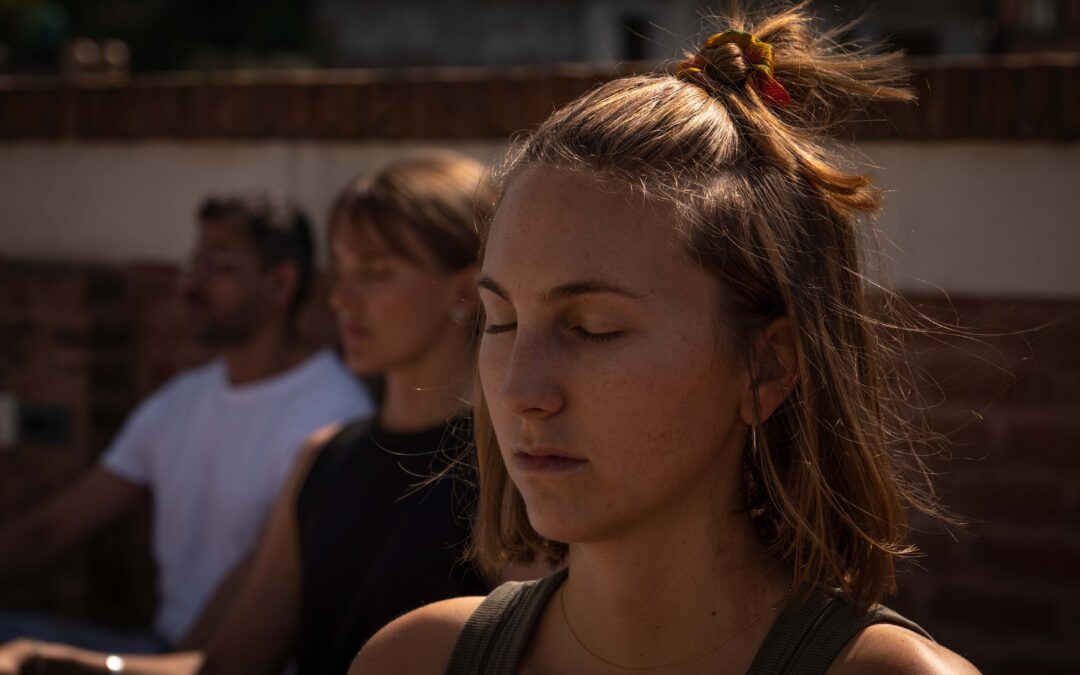In today’s fast-paced, high-pressure world, mental health problems like anxiety, depression, and stress are increasingly serious phenomena. Although various treatments are available, mental health yoga has its distinctive appeal as a holistic approach tackling the body as well as the spirit. It brings together movements designed not only to strengthen and stretch muscles but also to cure diseases, meditation, controlled breathing exercises, and advice on everything from diet and lifestyle to moral education to produce healthy physical, mental, and even social well-being.
Taking up the subject of mental health can help us understand why this ancient discipline is something that not only plays an indispensable role in maintaining and improving mental health but indeed should be seen as sharing responsibility for good mental health with other factors such as one’s occupation, family relationships or cultural background.
Understanding Mental Health Yoga
Mental health yoga is a specialized form designed to support mental and emotional well-being. Unlike traditional yoga, which may focus more on physical fitness, mental health yoga integrates mindfulness, breath control, and gentle movements to foster mental clarity and emotional balance. This approach makes mental health yoga particularly effective for those dealing with mental health challenges.
How Mental Health Yoga Impacts the Mind
The practice of mental health yoga has a profound impact on the mind, helping to alleviate symptoms of anxiety, depression, and stress. Here’s how mental health yoga works on a psychological level:
1. Stress Reduction: Mental health yoga activates the parasympathetic nervous system, often referred to as the “rest and digest” system. By engaging in mental health yoga, the body’s stress response is reduced, leading to a calmer state of mind.
2. Anxiety Relief: Mental health yoga incorporates breath control techniques that calm the nervous system. Deep breathing exercises, such as diaphragmatic breathing, help reduce anxiety levels by lowering heart rate and promoting relaxation.
3. Depression Management: Mental health yoga encourages the release of endorphins, the body’s natural mood lifters. Regular practice of mental health yoga can help alleviate symptoms of depression by enhancing overall mood and promoting a sense of well-being.
4. Mindfulness and Present-Moment Awareness: Mental health yoga emphasizes mindfulness, the practice of being fully present in the moment. This awareness helps individuals disengage from negative thought patterns and fosters a more positive and focused mindset.
5. Improved Emotional Regulation: Through mental health yoga, individuals learn to recognize and manage their emotions more effectively. This increased emotional awareness allows for better control over emotional responses and contributes to a balanced mental state.
Benefits of Mental Health Yoga
Mental health yoga offers numerous benefits that contribute to overall mental and emotional well-being:
1. Enhanced Mood: Regular practice of mental health yoga helps improve mood by increasing the production of serotonin and other feel-good hormones.
2. Reduced Anxiety and Stress: The calming effects of mental health yoga reduce the physical and psychological symptoms of anxiety and stress, leading to a more peaceful mind.
3. Better Sleep: It promotes relaxation and helps regulate sleep patterns, making it easier to fall asleep and stay asleep.
4. Increased Self-Awareness: This yoga fosters a deeper connection with oneself, promoting self-reflection and personal growth.
5. Greater Resilience: It builds mental strength and resilience, helping individuals cope with life’s challenges more effectively.
Mental Health Yoga Poses and Techniques
Certain poses and techniques are particularly beneficial for their calming and grounding effects:
1. Child’s Pose (Balasana): This gentle pose provides a sense of security and relaxation, making it ideal for reducing anxiety.
2. Legs-Up-the-Wall Pose (Viparita Karani): A restorative pose that promotes relaxation and reduces stress, helping to calm the mind.
3. Seated Forward Bend (Paschimottanasana): This forward fold encourages introspection and helps release tension in the body and mind.
4. Corpse Pose (Savasana): Often practiced at the end of a yoga session, this pose allows for complete relaxation and integration of the benefits of mental health.
5. Alternate Nostril Breathing (Nadi Shodhana): A breathing technique is used to balance the left and right hemispheres of the brain, promoting mental clarity and calmness.
6. Mindfulness Meditation: Incorporating mindfulness meditation helps cultivate awareness and presence, reducing rumination and enhancing emotional stability.
The Science Behind Mental Health Yoga
The effectiveness is supported by scientific research, which highlights how this practice positively influences mental health:
1. Neuroplasticity: This yoga practice promotes neuroplasticity, the brain’s ability to reorganize itself by forming new neural connections. This helps in adapting to new experiences and coping with stress.
2. Cortisol Reduction: Cortisol, the body’s primary stress hormone, is reduced through mental health yoga. Lower cortisol levels are associated with decreased stress and anxiety.
3. Improved Brain Function: It enhances cognitive function by improving blood flow to the brain and reducing inflammation. This leads to better memory, focus, and decision-making.
4. Mind-Body Connection: This strengthens the connection between the mind and body, allowing individuals to better understand and manage their mental health.
Integrating Mental Health Yoga into Your Routine
To experience the full benefits, consistency and mindfulness are key. Here’s how to integrate the mental health practices into your daily life:
1. Start Small: Begin with short sessions, gradually increasing the duration as you become more comfortable with the practice.
2. Create a Calm Environment: Practice in a quiet, peaceful space where you can focus without distractions.
3. Set Intentions: Before each session, set a clear intention for your practice, whether it’s to reduce stress, improve mood, or simply relax.
4. Be Patient: This Yoga is a gradual process. Be patient with yourself and allow time for the benefits to manifest.
5. Seek Guidance: If you’re new to mental health yoga, consider joining a class or following guided sessions to ensure you’re practicing safely and effectively.
Conclusion
Mental health yoga is a powerful tool for balancing the body and mind. By incorporating this practice into your daily routine, you can enhance your mental and emotional well-being, reduce stress, and build resilience against life’s challenges. Whether you’re dealing with anxiety, depression, or simply seeking a more peaceful mind, it offers a holistic approach to maintaining and improving mental health.

